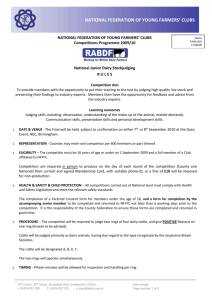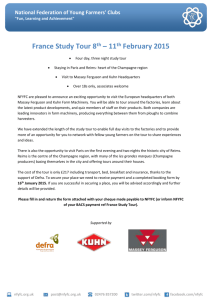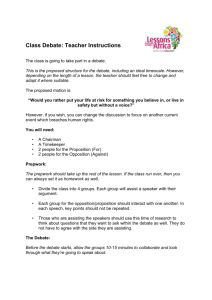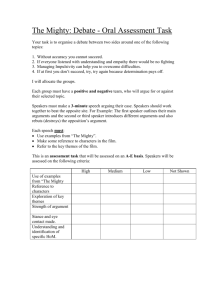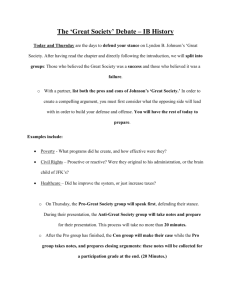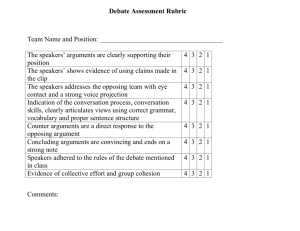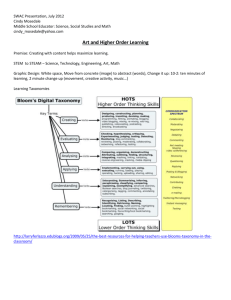26 & under - Young Farmers Clubs
advertisement
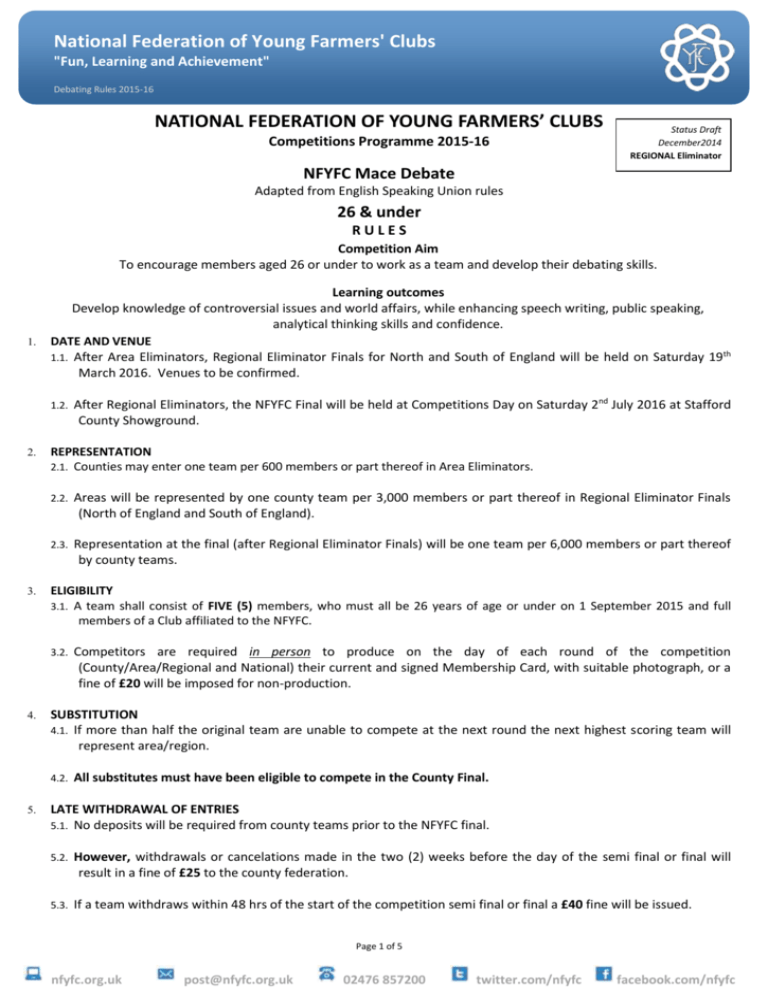
National Federation of Young Farmers' Clubs "Fun, Learning and Achievement" Debating Rules 2015-16 NATIONAL FEDERATION OF YOUNG FARMERS’ CLUBS Competitions Programme 2015-16 Status Draft December2014 REGIONAL Eliminator NFYFC Mace Debate Adapted from English Speaking Union rules 26 & under RULES Competition Aim To encourage members aged 26 or under to work as a team and develop their debating skills. 1. Learning outcomes Develop knowledge of controversial issues and world affairs, while enhancing speech writing, public speaking, analytical thinking skills and confidence. DATE AND VENUE 1.1. After Area Eliminators, Regional Eliminator Finals for North and South of England will be held on Saturday 19th March 2016. Venues to be confirmed. 1.2. 2. 3. REPRESENTATION 2.1. Counties may enter one team per 600 members or part thereof in Area Eliminators. 2.2. Areas will be represented by one county team per 3,000 members or part thereof in Regional Eliminator Finals (North of England and South of England). 2.3. Representation at the final (after Regional Eliminator Finals) will be one team per 6,000 members or part thereof by county teams. ELIGIBILITY 3.1. A team shall consist of FIVE (5) members, who must all be 26 years of age or under on 1 September 2015 and full members of a Club affiliated to the NFYFC. 3.2. 4. Competitors are required in person to produce on the day of each round of the competition (County/Area/Regional and National) their current and signed Membership Card, with suitable photograph, or a fine of £20 will be imposed for non-production. SUBSTITUTION 4.1. If more than half the original team are unable to compete at the next round the next highest scoring team will represent area/region. 4.2. 5. After Regional Eliminators, the NFYFC Final will be held at Competitions Day on Saturday 2nd July 2016 at Stafford County Showground. All substitutes must have been eligible to compete in the County Final. LATE WITHDRAWAL OF ENTRIES 5.1. No deposits will be required from county teams prior to the NFYFC final. 5.2. However, withdrawals or cancelations made in the two (2) weeks before the day of the semi final or final will result in a fine of £25 to the county federation. 5.3. If a team withdraws within 48 hrs of the start of the competition semi final or final a £40 fine will be issued. Page 1 of 5 nfyfc.org.uk post@nfyfc.org.uk 02476 857200 twitter.com/nfyfc facebook.com/nfyfc 6. PROCEDURE 6.1. The team will comprise of a Chairman, two speakers for the Proposition and two speakers for the Opposition. 6.2. The teams will be split so that the Chairman from Team A will work with the two proposition from Team B and the two opposition from Team C. 6.3. Debating subjects in the National Finals will be provided by the NFYFC twenty one days prior to the competition. Area rounds will debate subjects provided by the Area Committee twenty one days prior to the competition. 6.4. The Chairman and Debaters must be available to meet each other at least thirty minutes before competing time, to enable the Chairman to prepare his/her introductory notes. 6.5. The debate will take the following format: Page 2 of 5 nfyfc.org.uk post@nfyfc.org.uk 02476 857200 twitter.com/nfyfc facebook.com/nfyfc The role of each speaker: Chairman: The chair is responsible for inviting speakers to deliver their speech, thanking them and calling on the next speaker, calling on audience members to make points during the floor debate and maintaining good general order. Taking the vote and concluding the debate. 6.6. The chair is also responsible for time keeping, giving audible signals indicating when a speaker is in protected time (1 minute at the beginning and end of each speech) or unprotected time (middle section of each speech) and indicating when a speaker’s time is up. The chair should record the length of each speech and give the timings to the judges after the debate. First Proposition Speaker: Define the motion Outline the arguments the team will make Set up the debate in terms of what the proposition want to debate To offer Points of Information (POI) to other speakers First Opposition Speaker: Rebut the arguments made in the First Proposition speech Outline all the arguments to be made by Opposition Make a substantive case for the opposition instead of just denying what the proposition have said To offer Points of Information (POI) to other speakers Second Proposition Speaker: Rebut the argument made in the First Opposition’s speech Expand on the arguments made by their partner Introduce new arguments that expand on the case or to introduce a new angle of the argument and develop it fully To offer Points of Information (POI) to other speakers Second Opposition Speaker: Rebut the arguments made in the Second Proposition speech Expand on the arguments made by their partner To use the full range of arguments made in the debate to their advantage Introduce new arguments that expand on the case or to introduce a new angle of the argument and develop it fully To offer Points of Information (POI) to other speakers Opposition Summary Speaker: To use the full range of arguments made in the debate to their advantage; reminding the audience and adjudicators of the Points of Information their team made and why they exposed the flaws in the proposition case Refer to the floor debate and draw on points or queries from the audience to their advantage Persuade the audience and adjudicators that their case was stronger The summary speech should not contain any new material not raised in the main speeches or the floor debate Proposition Summary Speaker: To use the full range of arguments made in the debate to their advantage, reminding the audience and adjudicators of the Points of Information their team made and why they exposed the flaws in the proposition case Refer to the floor debate and draw on points or queries from the audience to their advantage Convince the audience and adjudicators that their case was better The summary speech should not contain any new material not raised in the main speeches or the floor debate 6.7. Points of Information Page 3 of 5 nfyfc.org.uk post@nfyfc.org.uk 02476 857200 twitter.com/nfyfc facebook.com/nfyfc These are central to the interactivity of the debate and demonstrate ability to engage in arguments (approx 25% of the teams marks are for listening and response) 6.7.2. These cannot be made during the first and last minute of the main speeches or during the summary speeches, this time is known as protected time. 6.7.3. Points of Information are included in the time limit. 6.7.4. An example of Point of Information: 6.7.1. Example of Points of Information First Proposition Speaker "a clear example of why the United Nations should be abolished was its failure to stop USA invading Iraq ....." Second Opposition Speaker Stands up and says: "On a Point of Information" First Proposition Speaker "...in 2004, despite regularly stating they wanted to stop the war." Yes Accept Point No First Proposition Speaker "yes please" (remains standing) First Proposition Speaker Second Opposition "Just because one country ignored the UN once, does not mean that the whole institution should be abolished Second Opposition "No thank you" (sits down) First Proposition Speaker "But that wasn't the only time; Israel has ignored Resolution 446 for thirty years and Iran and North Korea ..." First Proposition Speaker Continues their speech 6.8. Rebuttal 6.8.1. Addressing the other side’s arguments during your own speech is known as rebuttal 6.8.2. The aim or rebuttal is to undermine the oppositions case and leave your own case looking stronger 6.8.3. Rebuttal can be at any time during the speech but make sure the audience and adjudicators are clear that you are addressing the others sides arguments 6.9. The Vote shall be taken by a show of hands. 6.10. 7. The Chairman shall announce the result of the Vote and declare the meeting closed. SCALE OF MARKS Chairman 30 Expression and delivery (5) Organisation and prioritisation (5) Accuracy of timing (10) Overall control of debate (10) Main Speeches (1st Speaker) 40 Expression and delivery (10) Organisation and prioritisation (10) (includes timing – 1 mark deducted per 30 seconds over or part thereof) Reasoning and evidence (10) Listening and response (10) Page 4 of 5 nfyfc.org.uk post@nfyfc.org.uk 02476 857200 twitter.com/nfyfc facebook.com/nfyfc Main Speeches (2nd Speaker) 40 Expression and delivery (10) Organisation and prioritisation (10) (includes timing – 1 mark deducted per 30 seconds over or part thereof) Reasoning and evidence (10) Listening and response (10) Summary Speeches 20 Expression and delivery (5) Organisation and prioritisation (5) (includes timing – 1 mark deducted per 30 seconds over or part thereof) Reasoning and evidence (5) Listening and response (5) Total per team 230 (Includes Chairman, 2x Opposition Speakers 2x Proposition Speakers) 8. GLOSSARY OF TERMS Speech – An oral presentation given on a particular motion Motion – The issue to be debated, usually beginning with “This House believes ....” Debate – A contest which positive and negative sides of a motion are advocated by speakers on opposite sides House – Where the debate takes place Floor – The members of the audience Proposition – The team that argues in favour of the motion Opposition – The team that argues against the motion Point of Information (POI) – A formal interjection which is made during an opposing speakers speech. Protected Time – The period of time during which Point of Information may not be offered. Unprotected Time – The period of time during which the Point of Information may be offered. Expression and Delivery – Use of notes, use of voice, use of words, use of body language, use of humour Organisation and Prioritisation – Team structure and how speeches complement each other, individual structure of speech coherence, adaptability and use of time Reasoning and evidence – clarity and logic, examples, facts, references, links to the motion Listening and response – rebuttal, making points of information, taking points of information Further information on how to be a successful debating team can be found via the competitions tab at www.nfyfc.org.uk or www.esu.org on both pages The Speech and Debate Competition Handbook (Use the Mace Section) can be downloaded. 9. AWARDS 9.1. NFYFC Regional Finals 9.1.1. NFYFC Prize Cards will be awarded to teams placed 1st, 2nd and 3rd on the day of the Regional Final 9.1.2. NFYFC Certificates of Achievement will be awarded to all members of teams placed 3rd to 5th on the day of the Regional Final, i.e. those that do not qualify for the NFYFC final 9.2. NFYFC Final At the NFYFC Final the team placed 1st will be awarded the Novartis Trophy and Prize Cards 9.2.1. 9.2.2. Teams placed 2nd and 3rd will be awarded Prize Cards 9.2.3. NFYFC Certificates of Achievement will be awarded to all members of teams placed 1st to 5th 9.2.4. At the NFYFC Final individual a Prize Card will also be awarded to the Best Speaker 10. NOTES: 10.1. IMPORTANT: Competitors are reminded to read carefully the General Rules relating to National Competitions if they are taking part in this Competition. These are available from the NFYFC website. 10.2. This competition WILL carry points towards the NFU Trophy – finalists only (not regional finalists). 10.3. Members will be disqualified if they are not at the Presentation of Awards without prior permission being granted. Page 5 of 5 nfyfc.org.uk post@nfyfc.org.uk 02476 857200 twitter.com/nfyfc facebook.com/nfyfc
